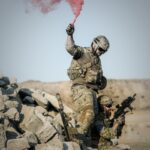Azerbaijan Launches Operation against Nagorno-Karabakh and Demands Surrender
The Current Situation
Azerbaijan has declared that its military operations in the Nagorno-Karabakh region will continue until ethnic Armenian separatists surrender. The move comes after tensions have been high for months in the South Caucasus around the breakaway enclave, which is internationally recognized as part of Azerbaijan. The recent conflict marks the second time Azerbaijan and Armenia have gone to war in Nagorno-Karabakh in the last three years.
Azerbaijan‘s Military Measures
In a statement released by Azerbaijan‘s defense ministry on Wednesday morning, the country claimed that it had neutralized the military equipment of the Armenian armed forces, including military vehicles, artillery, and anti-aircraft missile installations. Azerbaijan has demanded that “illegal Armenian military formations” hand over their arms and dissolve their “illegal regime.” The aim of Azerbaijan‘s offensive appears to be the complete conquest of the mountainous enclave.
Armenia’s Response
Armenian Prime Minister Nikol Pashinyan accused Azerbaijan of starting a ground operation with the intent of ethnic cleansing. However, there have been growing frustrations among Armenians over their country’s response, leading to clashes with police in Yerevan. Protesters have condemned their leader as a traitor and called for his resignation.
The Role of Russia
Since the end of 2020, 3,000 Russian soldiers have been monitoring the fragile truce in Nagorno-Karabakh. However, Russia’s attention has been diverted by its full-scale invasion of Ukraine. Russia has claimed that it helped move almost 500 civilians from high-risk areas, while separatists have asserted that they facilitated the movement of a total of 7,000 individuals.
Analysis and Discussion
Historical Context
The conflict between Azerbaijan and Armenia over Nagorno-Karabakh has deep historical roots. It first broke out in the early 1990s after the fall of the Soviet Union, resulting in a war between the two nations. Although a truce was agreed upon in 2020 and monitored by Russian peacekeepers, tensions have persisted, and Azerbaijan has now launched a new offensive.
The Lachin Corridor
Azerbaijan‘s recent military actions in Nagorno-Karabakh are partly a response to the deaths of six individuals, including four police officers, in two landmine blasts. Additionally, Azerbaijan has imposed a blockade on the Lachin Corridor, the only route into the enclave from Armenia, for the past nine months. This blockade has further fueled tensions and contributed to the escalation of violence.
Russian Involvement and the Impact of Ukraine
Russia’s involvement in the conflict has been complicated by its invasion of Ukraine. The diversion of Russian attention has potentially emboldened Azerbaijan, leading it to take more decisive action in Nagorno-Karabakh. The lack of robust international oversight and mediation has left the conflict unresolved, allowing for more military confrontations to take place.
Azerbaijan‘s Aim for Complete Conquest
Azerbaijan‘s recent offensive demonstrates its desire for a complete conquest of Nagorno-Karabakh, a region predominantly inhabited by ethnic Armenians. This poses a significant threat to the Armenian population in the enclave, as their weakened position due to the blockade has left them vulnerable to further aggression.
Editorial and Advice
The Urgent Need for Mediation
The conflict in Nagorno-Karabakh requires immediate international mediation to prevent further escalation and loss of life. The United Nations, Russia, the United States, and other relevant stakeholders must come together to facilitate dialogue between Azerbaijan and Armenia and push for an immediate ceasefire.
The Importance of International Humanitarian Law
Both Azerbaijan and Armenia must adhere to the principles of international humanitarian law, ensuring the protection of civilians and civilian infrastructure. Any deliberate targeting of civilians or civilian buildings should be condemned by the international community.
The Role of Regional and Global Powers
Regional powers, such as Turkey, and global powers, such as Russia and the United States, need to use their influence to de-escalate tensions and find a peaceful resolution. These powers must emphasize the importance of dialogue, compromise, and respect for international law.
Moving towards a Sustainable Peace
To achieve a sustainable peace in Nagorno-Karabakh, a comprehensive and inclusive peace process is crucial. This process should involve the participation of all relevant stakeholders and address the underlying grievances and aspirations of both Azerbaijanis and Armenians in the region.
Avoiding Further Humanitarian Crisis
The military actions and displacement caused by the conflict in Nagorno-Karabakh risk exacerbating the humanitarian crisis in the region. The international community must allocate resources to provide assistance and support for the affected populations, ensuring access to basic necessities and vital services.
In conclusion, the recent escalation of violence in Nagorno-Karabakh demands immediate attention and concerted efforts by the international community to facilitate a ceasefire and promote a peaceful resolution. Failure to address the conflict adequately could lead to further humanitarian suffering and instability in the region.

<< photo by Markus Winkler >>
The image is for illustrative purposes only and does not depict the actual situation.
You might want to read !
- Bloodshed in the Caucasus: Azerbaijan’s Military Offensive in Nagorno-Karabakh
- Let the Music Unburden You: Imagine Dragons Encourage Reading Festival Goers to Find Solace in Melody
- Editorial Exploration: Reflecting on the Success of Red Bull Racing in Formula 1
Title: “Red Bull Racing Achieves Monumental Milestone: Clinching 100 Wins in Formula 1”
- “The Return of European Football: Five Must-Watch UEFA Champions League Matches”
- Canada-India Sikh Leader Controversy: Unveiling Allegations and Diplomatic Tensions
- The Rise of the Goalkeeper-Scorer: Lazio Keeper’s Sensational Equalizer in Champions League Match
- “The Xavi Era Begins: FC Barcelona Takes on Royal Antwerp in a Transformative Showdown”
- Extreme Climate Extremes: Australia’s Scorching Spring and America’s Chilling Surprise




